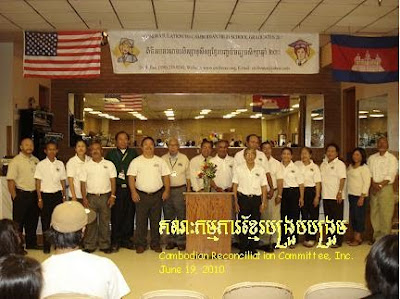22/6/2010
By Kok Sap
Originally posted at http://khamerlogue.wordpress.com/
In honesty, Surya Subedi can be Hun Sen helpful ally and personal messenger to the world diplomacy and UN General Secretary office. Unfortunately Hun Sen wrongly takes it personal in misinterpreting Surya Subedi statement to the press as disappointed for unable to meet with the Cambodia owner. It's opportune for Hun Sen to rattle on someone of his unchecked and crude remarks to impress the stupid ones. Apparently he can't see how important to delicately and discretely handle his personal crisis. This man loves to hear his own voice on stage,all the times.
To the dismay, Hun Sen shall apologize for his own shortcomings and inability to delegate an able deputy to welcome and meet with UN Envoy to ask for reschedule. In the educated society, Hun Sen behavior leaves room for bad impression and misinterpretation that Cambodia leader is seriously lack of competence and diplomatic cordiality.
In 1991 Paris Peace Accord stipulates UN Secretariat will monitor and report Cambodia human rights to the UN mission and its appropriate council. It is made UN responsibility to ensure the annual report be as accurate and transparent on Cambodia human rights. However, as one of the signatories Hun Sen seems to show his unbecoming and uncooperative nature as the Cambodia leader and lawful UN member.
Obviously the responsibility is not entirely on Hun Sen alone. To the observers, Cambodia legislative and judiciary shall bear the burden and responsibility to the nation image and representation. In this episode, the national assembly is totally unaccounted for its role to scrutinize and call on Hun Sen improper official action. Worst, Hun Sen incessant quarrel and insolences toward the previous UN human rights envoys seemed escaping the national assembly attention span and responsibility. Hun Sen has become a fixture of the Cambodian government incompetence and incivility.
Past records show often Hun Sen has been personally rude and confrontational to the volunteered UN human rights officials whose mission was to look out for Cambodia citizen interests. Conclusively in spite of time in premier office and role Hun Sen remains not an ideal advocate and voice in modern world diplomacy for the weak and poor Cambodia. The national assembly needs to reflect and uses its spine to stop Hun Sen from dehumanizing Cambodia.
In all, yet the national assembly must not allow Hun Sen to deprecate Cambodia honor and dignity when his personal is inconvenient to his duty. To the outside world it appears Cambodia has not many people who can lead the nation in decency and dignity. In that notion, if the national assembly does not correct Hun Sen habitual abuse of power and defeatism then it is a mere rubber stamp for a handsome compensation paid by donors. It is an insult and unacceptable to the nation and human intelligence in allowing an inferior and defeatist mentality like Hun Sen to stay in power and above the law too long






























